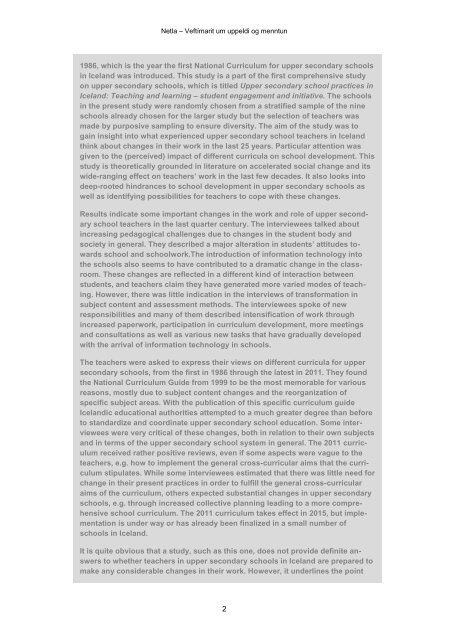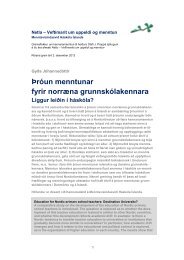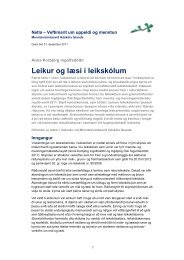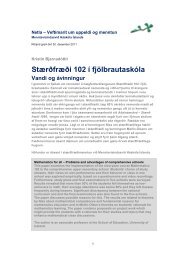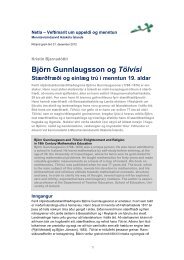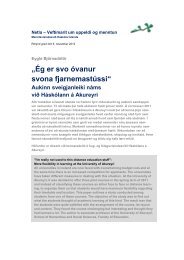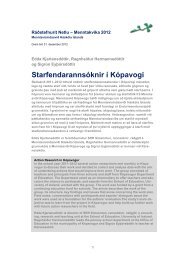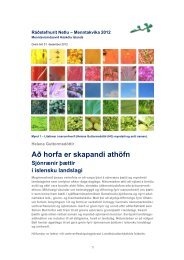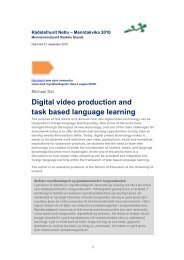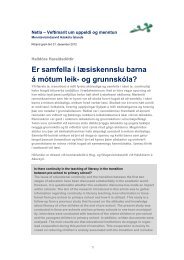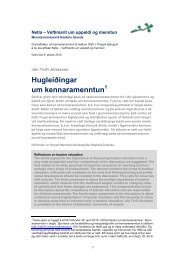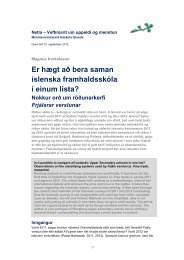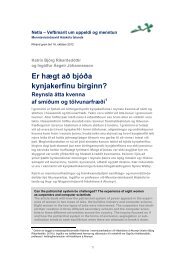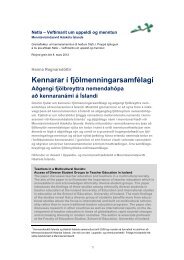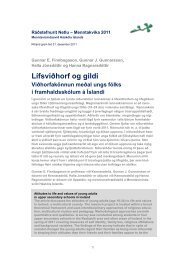Fleiri vindar blása - Netla - Háskóli Íslands
Fleiri vindar blása - Netla - Háskóli Íslands
Fleiri vindar blása - Netla - Háskóli Íslands
You also want an ePaper? Increase the reach of your titles
YUMPU automatically turns print PDFs into web optimized ePapers that Google loves.
<strong>Netla</strong> – Veftímarit um uppeldi og menntun<br />
1986, which is the year the first National Curriculum for upper secondary schools<br />
in Iceland was introduced. This study is a part of the first comprehensive study<br />
on upper secondary schools, which is titled Upper secondary school practices in<br />
Iceland: Teaching and learning – student engagement and initiative. The schools<br />
in the present study were randomly chosen from a stratified sample of the nine<br />
schools already chosen for the larger study but the selection of teachers was<br />
made by purposive sampling to ensure diversity. The aim of the study was to<br />
gain insight into what experienced upper secondary school teachers in Iceland<br />
think about changes in their work in the last 25 years. Particular attention was<br />
given to the (perceived) impact of different curricula on school development. This<br />
study is theoretically grounded in literature on accelerated social change and its<br />
wide-ranging effect on teachers’ work in the last few decades. It also looks into<br />
deep-rooted hindrances to school development in upper secondary schools as<br />
well as identifying possibilities for teachers to cope with these changes.<br />
Results indicate some important changes in the work and role of upper secondary<br />
school teachers in the last quarter century. The interviewees talked about<br />
increasing pedagogical challenges due to changes in the student body and<br />
society in general. They described a major alteration in students’ attitudes towards<br />
school and schoolwork.The introduction of information technology into<br />
the schools also seems to have contributed to a dramatic change in the classroom.<br />
These changes are reflected in a different kind of interaction between<br />
students, and teachers claim they have generated more varied modes of teaching.<br />
However, there was little indication in the interviews of transformation in<br />
subject content and assessment methods. The interviewees spoke of new<br />
responsibilities and many of them described intensification of work through<br />
increased paperwork, participation in curriculum development, more meetings<br />
and consultations as well as various new tasks that have gradually developed<br />
with the arrival of information technology in schools.<br />
The teachers were asked to express their views on different curricula for upper<br />
secondary schools, from the first in 1986 through the latest in 2011. They found<br />
the National Curriculum Guide from 1999 to be the most memorable for various<br />
reasons, mostly due to subject content changes and the reorganization of<br />
specific subject areas. With the publication of this specific curriculum guide<br />
Icelandic educational authorities attempted to a much greater degree than before<br />
to standardize and coordinate upper secondary school education. Some interviewees<br />
were very critical of these changes, both in relation to their own subjects<br />
and in terms of the upper secondary school system in general. The 2011 curriculum<br />
received rather positive reviews, even if some aspects were vague to the<br />
teachers, e.g. how to implement the general cross-curricular aims that the curriculum<br />
stipulates. While some interviewees estimated that there was little need for<br />
change in their present practices in order to fulfill the general cross-curricular<br />
aims of the curriculum, others expected substantial changes in upper secondary<br />
schools, e.g. through increased collective planning leading to a more comprehensive<br />
school curriculum. The 2011 curriculum takes effect in 2015, but implementation<br />
is under way or has already been finalized in a small number of<br />
schools in Iceland.<br />
It is quite obvious that a study, such as this one, does not provide definite answers<br />
to whether teachers in upper secondary schools in Iceland are prepared to<br />
make any considerable changes in their work. However, it underlines the point<br />
2


